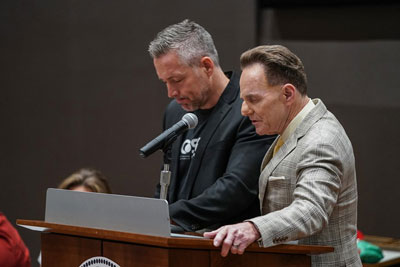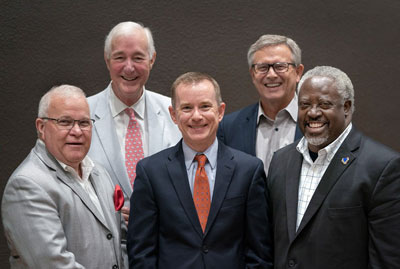BIRMINGHAM, Ala.—Sexual abuse and racism would draw heightened action within the Southern Baptist Convention under recommendations to be considered during the June 11-12 SBC annual meeting in Birmingham, Ala.
A key recommendation, approved by the SBC Executive Committee in its June 10 meeting, calls for repurposing the SBC Credentials Committee to field claims against churches in regard to sexual abuse and discrimination based on ethnicity as well as matters such as homosexuality that would call their relationship with the SBC into question.

Matt Miller
Ronnie Floyd (right) president and CEO of the Southern Baptist Convention’s (SBC) Executive Committee and former president of the SBC, prays over J.D. Greear, current president of the SBC, during the Executive Committee’s meeting June 10 at the Sheraton Hotel in Birmingham, Ala.
The Executive Committee also approved recommendations to amend the SBC constitution to specify sexual abuse and racism as grounds for declaring a church as “not in friendly cooperation.” The SBC amended its constitution in regard to homosexuality in 1993.
SBC President J.D. Greear, in his greeting to EC members, said Southern Baptists are “at a defining moment” in how they respond to some of the challenges before them.
“I want to be careful not to overblow this … [but] how we respond to some of these things that are ahead of us will not only shape our witness in the present, it will also shape who Southern Baptists are for generations to come.”
Greear, pastor of The Summit Church in North Carolina, said he has come to know pastors in a “different and deeper way” during his first year as SBC president, and the vast majority “without exception almost, are horrified by what they hear is happening, and most of them just want to be led in what is the right thing to do here.”
Greear commended national, state and associational leaders who have worked to address the sexual abuse crisis and said, “We know that the cost and the difficulty of some of this will be challenging, but we also know that the cost and the difficulty of doing nothing will be much more challenging.”
Some well-meaning people have wondered whether the sexual abuse issue is a distraction from the main mission, Greear said.
“Brothers and sisters, this is our mission. As shepherds of God’s people, we are charged to protect God’s people and we are also charged to reflect the Gospel, and we serve a Savior who laid down His life for the vulnerable, to offer a safe refuge for them. That means that God’s shepherds ought to be willing to show the same degree of fierceness in their devotion to this,” Greear said.
Ronnie Floyd, the EC’s new president and CEO, also underscored “the importance of the moment in Southern Baptist history … to speak in a moment when our culture needs to hear us speak.”
“I just have prayed and asked God for wisdom for each one of you,” Floyd told the 69 EC members in attendance, “that we will bear forth the fruit of the Holy Spirit as we walk through these times and in these conversations that we have.”
In his first EC meeting as president, Floyd, formerly the longtime senior pastor of Cross Church in northwest Arkansas, expressed gratitude to the EC for the “extraordinary privilege to serve in this position of servant leadership to you and to the churches of the Southern Baptist Convention. I will be faithful to serve those churches in whatever capacity that we possibly can, for the good of the Gospel and for the propagation of the Gospel across America and the world.”

Matt Miller
Newly elected 2019 Southern Baptist Convention Executive Committee officers: Tom Tucker, senior pastor of Sisk Memorial Baptist Church, Rock Hill, S.C., chair of the administrative committee; Joe Knott, lawyer, Raleigh, N.C., secretary; Mike Stone, pastor of Emmanuel Baptist Church, Blackshear, Ga., chairman; Steve Goss, physician and president of Mercy Clinic Northwest Arkansas, chairman of the business and finance committee; Rolland Slade, senior pastor of Meridian Southern Baptist Church, El Cajon, Calif., vice chairman.
Two-thirds votes ahead
The repurposed Credentials Committee, if approved by a two-thirds vote of messengers as an amendment to the SBC’s bylaws, would be a nine-member standing committee. A constitutional amendment, meanwhile, requires a two-thirds vote at two consecutive annual meetings.
EC members approved the proposed Credentials Committee and sexual abuse constitutional amendment by voice votes, with several members in the negative; the constitutional amendment involving racism passed unanimously.
Specifics of the EC’s recommendation for a standing Credentials Committee include:
• A composition of the SBC’s registration secretary, the EC chairman and, for three-year terms, three members nominated by the Executive Committee and four members nominated by the Committee on Nominations for approval by messengers to serve staggered terms at the committee’s outset.
• An assignment to review any information available when an issue arises during annual meeting whether a church is in cooperation with the convention. The Credentials Committee shall either (a) consider the question and, when prepared, make a recommendation to the Executive Committee or (b) make a recommendation to the convention at the earliest opportunity, which will be immediately considered. One representative of the church and one representative of the Credentials Committee shall be permitted to speak to the question, subject to the normal rules of debate.
• An assignment between annual meetings when an issue arises to review any information available. If the committee deems that a church is not in cooperation with the convention, it shall submit a report to the Executive Committee with the committee’s reasons. The EC, at its next meeting, shall consider the report to make a determination. The decision can be appealed to the convention at least 30 days prior to the annual meeting, when the matter will be considered as part of miscellaneous business on the afternoon of the first day of the convention.
• An opportunity for a disfellowshipped church to seek reconsideration by the Credentials Committee if the church asserts it has addressed the matters which led to its removal as a cooperating church, subject to a vote by the Executive Committee.
• Instruction that its queries to a church should never attempt to exercise authority over the church in violation of Article IV of the SBC constitution.
• Creating a Registration Committee, modeled after the manner the Credentials Committee has operated in the past, to continue being appointed by the SBC president for each annual meeting to be involved with the registration process of messengers.
Questions regarding liability that could confront the Executive Committee arose at several points in the discussion of the proposed constitutional amendment on sexual abuse and creation of a repurposed Credentials Committee.
SBC attorney Jim Guenther noted that risks would not necessarily increase if the Credentials Committee would be handling inquiries instead of the current process involving the EC’s Bylaws Workgroup as to whether a church is in cooperation with the SBC.
On the matter of “ascending liability” in which a lawsuit against a local church would entangle the SBC, Guenther cited both the autonomy of the local church and the SBC. Baptist autonomy, he said, is a “sincerely held religious belief” that would be a “valid and successful defense” to protect the convention.
The SBC, Guenther said, cannot make a church safe. “Only churches can make churches safe,” he said, adding that the convention can take numerous steps to help churches in the areas of training and resources to prevent sexual abuse.
Pending messengers’ approval of the Credentials Committee, the Executive Committee voted to nominate its three members for the standing committee: Linda Cooper, president of national WMU; Stacey Bramlett, the EC’s outgoing secretary and senior vice president of Independent Bank in Cedarville, Tenn.; and Mike Lawson, senior pastor of First Baptist Church in Sherman, Texas.
Repurposing the Credentials Revisions would entail revisions to SBC Bylaw 8 regarding Messenger Credentials and Registration; SBC Bylaw 15 governing the Committee on Nominations; and SBC Bylaw 29 on Participation in Convention Affairs.
The proposed constitutional amendments entailed revising into more succinct wording the proposals as adopted by the Executive Committee at its February meeting. (BP)
Art Toalston